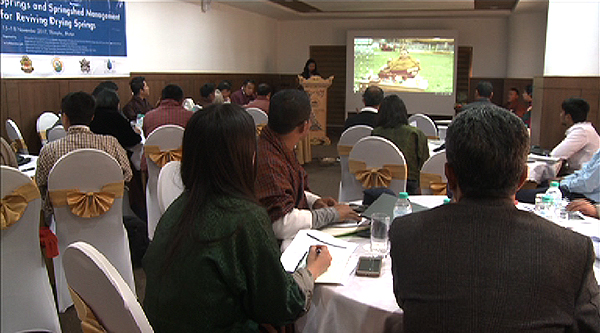 To reduce the water stress faced by mountain communities, a workshop to share a step-wise method for managing springs and spring sheds and revive drying springs is under way in Thimphu.
To reduce the water stress faced by mountain communities, a workshop to share a step-wise method for managing springs and spring sheds and revive drying springs is under way in Thimphu.
Mountain springs are the primary source of water for millions of people in the mid-hills of Hindu Kush Himalaya (HKH). The HKH region covers eight countries-Afghanistan, Bangladesh, Bhutan, China, India, Nepal, Myanmar and Pakistan.
Both rural and urban communities in these countries depend on springs for meeting their drinking, domestic and agriculture water needs. However, an increasing evidence of springs drying up is reducing spring discharge and deteriorating spring water quality in many parts of the HKH region
According to an official from the Watershed Management Division (WWD) of the of the Ministry of Agriculture and Forests , many springs in the country, including Lholing spring in Paro, Gurburi and Chukhormani in Zhemgang, have dried up.
“It’s basically because of climate change as we know we are getting less and less snow in Bhutan,” said Dr Jigme Tenzin, the Officiating Chief of the Watershed Management Division.
“There is also the change in land use. We have farm roads coming up. One example is in Monggar where a farm road has been cut across the spring. When this happens, it cuts off the spring recharge area. Degradation due to development, and forest fires are other factors.”
Using scientific hydro geological method, the workshop will help people identify the drying springs and the reasons why the springs are drying up. It will also help understand the recharge area of spring. “Once we know where the recharge area is, then we do interventions there,” said Dr Aditi Mukherji, Team leader with ICIMOD.
“Interventions could be physical interventions, like digging a pond or trench. I think we increase the chances of the spring getting revived but it is not 100 percent full proof. We would never guarantee that every time there would be a spring revival but by understanding the recharge area, we just increase the chances.”
The four-day workshop is organized by the International Centre for Integrated Mountain Development (ICMOD) in collaboration with WMD and other relevant stakeholders.









